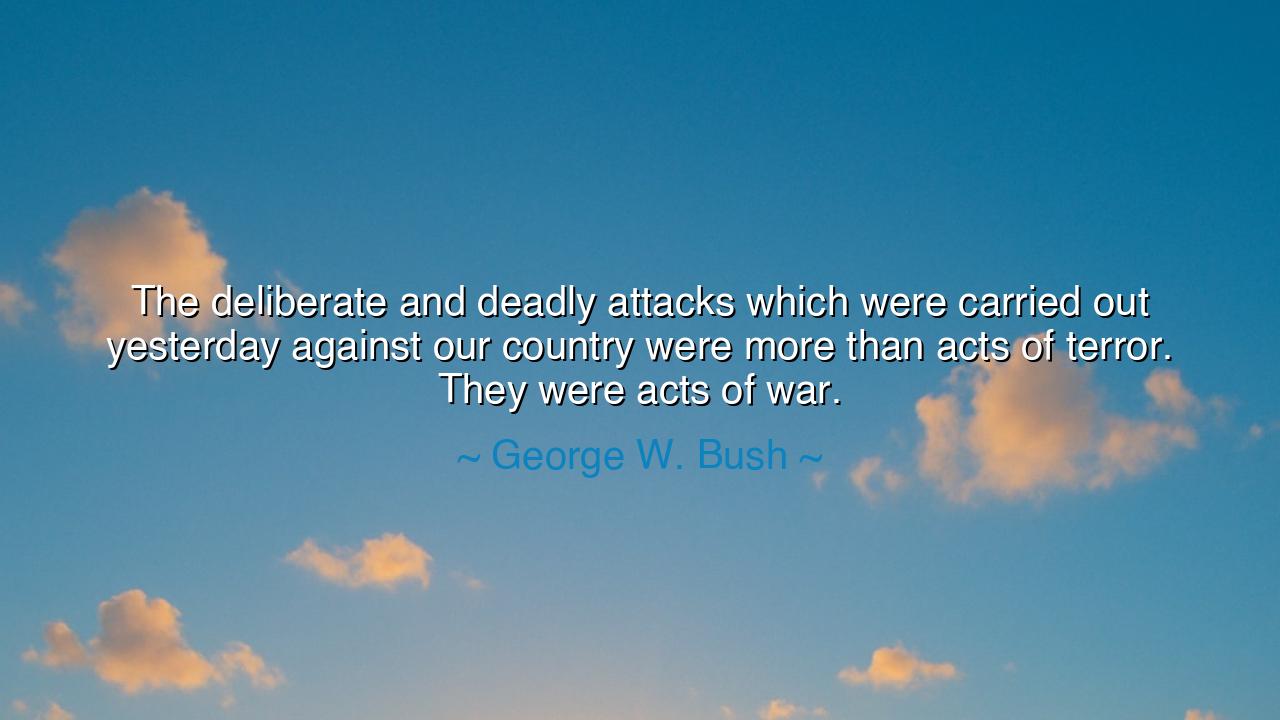
The deliberate and deadly attacks which were carried out
The deliberate and deadly attacks which were carried out yesterday against our country were more than acts of terror. They were acts of war.






“The deliberate and deadly attacks which were carried out yesterday against our country were more than acts of terror. They were acts of war.” Thus declared George W. Bush, the 43rd President of the United States, on the solemn morning of September 12, 2001, one day after the towers of New York fell and the heart of America trembled. These words were not mere rhetoric; they were the voice of a nation awakening to a new and terrible reality. In that moment, Bush gave form to the grief and fury of millions. He named what had happened not as a crime, nor as an outrage alone, but as an assault upon civilization itself — an act of war, deliberate and deadly, demanding not only mourning but resolve.
The origin of this quote lies in the aftermath of the September 11 attacks, when four hijacked planes became weapons, and the ordinary morning sky turned into a battlefield. Nearly 3,000 lives were lost — men and women, workers and rescuers, citizens of many nations — all victims of an unseen enemy whose aim was not conquest of land, but the destruction of spirit. The President’s words, spoken from the White House the next day, marked the moment when grief transformed into purpose. His declaration was both an acknowledgment of loss and a vow: that the United States, and indeed the free world, would not endure such violence in silence.
When Bush said the attacks were “more than acts of terror”, he meant that the scale and intent of the strike exceeded the boundaries of mere intimidation. Terrorism seeks to sow fear; war seeks to destroy. The fall of the Twin Towers, the strike upon the Pentagon, and the crash of Flight 93 — where passengers rose in courage to prevent further devastation — were not isolated acts of hatred but part of a calculated campaign. To call it “war” was to awaken the world to the magnitude of the moment. It was to declare that this was not chaos but challenge — and that challenge demanded a response measured in courage, unity, and endurance.
Throughout history, such turning points have come when violence shatters the illusion of safety and demands a moral awakening. When Pearl Harbor was bombed in 1941, President Franklin D. Roosevelt spoke of “a date which will live in infamy.” When Lincoln faced rebellion, he called the Civil War not merely a political struggle, but a test of the nation’s soul. Bush’s words stand in this lineage of leadership born in crisis — a reminder that in the darkest hours, the task of the leader is to define the moment, to name evil plainly, and to summon from the people the will to overcome it.
Yet the quote carries more than political weight; it is an echo of an ancient truth: that evil, when left unopposed, grows bold. Bush’s declaration that this was an act of war was not only strategic — it was moral. He recognized that to protect freedom, a people must sometimes rise in defense of it, not with vengeance, but with purpose. In his words can be heard the same spirit that moved nations to resist tyranny, to rebuild from ruin, and to defend the dignity of the human spirit. He sought to transform fear into unity, grief into strength, and pain into perseverance.
But the years that followed would reveal the heavy cost of such a declaration. Wars in Afghanistan and Iraq would stretch across decades, claiming countless lives, testing alliances, and stirring debate about justice and consequence. The quote, then, stands as both a rallying cry and a warning — for once a nation declares war, it must remember that war unleashes forces that cannot easily be contained. It calls forth the best and the worst of humanity: courage and compassion, but also sorrow and loss. Bush’s words remind us that to name something an act of war is to cross a threshold from which there is no easy return.
And yet, the lesson of his words endures: that in every age, evil must be met with courage, and freedom must be guarded not by complacency, but by vigilance. The deliberate and deadly acts of September 11 were designed to divide, but instead they united a people in mourning, in faith, and in resolve. They reminded the world that in times of darkness, the true measure of a nation lies not in its wealth or power, but in the strength of its spirit.
So, my children, take this teaching to heart. In every life, there will come moments of assault — not from armies, but from fear, despair, or hatred. When such moments arise, remember this: to face them with courage is the first act of victory. Do not yield to silence or paralysis. Stand firm, as nations must stand firm, and meet the terrors of the day not with surrender, but with the steadfast will to protect what is right and sacred. For though the world may tremble, it is only by the strength of the brave that civilization endures.
Thus, Bush’s words still speak beyond the battlefield: in every generation, the war between fear and freedom continues. And it is the duty of each soul — not only of leaders, but of all people — to take their place in that struggle, to ensure that light does not yield to darkness, and that hope, even in ashes, rises again.






AAdministratorAdministrator
Welcome, honored guests. Please leave a comment, we will respond soon